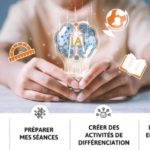🎥 Behind the Scenes of the National Days of the Digital Educational Territories (TNE) in Poitiers, held on October 8th and 9th, 2024.
« On a daily basis in my classroom, the TNE initiative has allowed me to offer new pedagogical solutions and work with new digital resources. The TNE has provided new equipment that is fast, efficient, and appealing to students, » says Benoît Hecht, ULIS teacher-coordinator at Jean Rostand Middle School in Neuville-de-Poitou, Vienne.
The Origins of the Initiative
As Florence Biot, Deputy Director of Digital Transformation at the Digital Education Directorate, recalls, the idea of TNE was born during the Digital General Assembly, « at a time when we were all in lockdown, to draw lessons from this very specific period of being ‘thrown into the deep end’ of digital technologies. »
This is a completely different approach to digital development, as it is based on initiatives driven by local territories.
« TNE are territorial demonstrators for the use of digital technology in schools, from kindergarten to high school, and for the adoption of digital tools by teachers, students, educational teams, and parents, » explains Mireille Brangé, National Coordinator of the Education and Digital Strategy at the General Secretariat for Investment.
Understanding Digital Educational Territories (TNE)
The TNE initiative is a public policy implemented initially in two pilot departments—Aisne and Val d’Oise—in 2020, followed by ten additional departments joining the program in 2021. It is funded for a duration of four years.
« These are territorial demonstrators, in real conditions, of a public policy shared between academic services and local authorities, » explains Mireille Brangé.
The program’s implementation varies across territories, as demonstrated by some of the testimonials we gathered.
« In our area, we focused on students with special needs. We worked to provide them with the necessary equipment to help them develop their skills, whether within the ULIS program, for traveling children, or non-native speakers, » describes Philippe Alverny, National Education Inspector in Val d’Oise, under the Versailles Academy.
Collaboration at the Core of TNE
For TNE to succeed, it is essential to have stakeholders « working together in alliance, » emphasizes Florence Biot. These key stakeholders include local authorities, « who have committed themselves and, in some cases, agreed to take the lead, » she adds.
Institutions involved in the TNE initiative include:
- The General Secretariat for Investment (SGPI): Funds the program as part of the France 2030 investment plan and launched TNE alongside the Ministry of National Education.
- The Bank of Territories: Organizes the TNE National Days and implements the program in collaboration with academic institutions, partner local authorities, and two key operators:
- Réseau Canopé: Manages training and resource deployment.
- GIP Trousse à Projets: Oversees the parental involvement component.
Emmanuel Morin, DRANE (Regional Digital Delegate for Education) in Guadeloupe, highlights how TNE has strengthened partnerships: « TNE has allowed us to work better with local authorities, understand expectations, and establish common protocols for managing projects. It has introduced a new way of collaborating, especially on educational issues. »
DASENs (Departmental Directors of National Education Services) and DRANEs, already familiar with the digital strategy and equipped with knowledge of the local resources available, are crucial links in the chain.
« They are the ones organizing the program’s deployment closest to the ground, » notes Florence Biot.
Selecting the Territories
« These demonstrators were based on shared diagnostics between local authorities and academic institutions regarding existing resources in these areas, as well as on potential educational projects, some of which had already been initiated, » explains Mireille Brangé.
« Some initially hesitant local authorities eventually joined the initiative. As a result, we now have digital festivals and video game events taking place in both large cities and more modest locations, which is where it gets really interesting, » says Sabrina Caliaros, former DRANE for the Occitanie Academic Region.
By learning from one another, TNE has fostered a spirit of teamwork. Participants exchange tips and insights, which has proven to be the key to its success.
Deploying the TNE Program
Five key components have been implemented as part of the TNE initiative:
- Equipment: Establishing a fundamental digital infrastructure in schools to support the policy’s rollout.
- Resources: Providing educators with access to selected digital educational resources.
- Training: Offering training on using these resources and digital tools, as well as on digital education in general.
- Inclusion: Supporting a strong inclusive education policy through and with digital tools.
- Parental Involvement: Encouraging parents’ engagement in their children’s digital education.
« We are proud of the TNE program overall and of all the projects we have implemented, » says Stéphane Pottier, Director of Digital Transformation at the Vosges Departmental Council.
« If I had to highlight one project, it would be the hybrid learning initiative. We aimed to bring students unable to attend class closer to the classroom experience, immersing them through digital tools, » he adds.
Looking Ahead: The Next Phase of TNE
After three years of deployment, the TNE program is at a pivotal development stage, as Florence Biot points out.
« We are entering an era of economic prudence and aim to scale up with less funding but greater intelligence, collaboration, and co-construction to advance further together, » she concludes.
Learn more about the TNE program:
- eduscol.education.fr/2177/les-territoires-numeriques-educatifs-tne
- www.education.gouv.fr/les-territoires-numeriques-educatifs
Also, check out an example of the TNE initiative’s implementation in the city of Béziers in one of our Ludomag reports.







